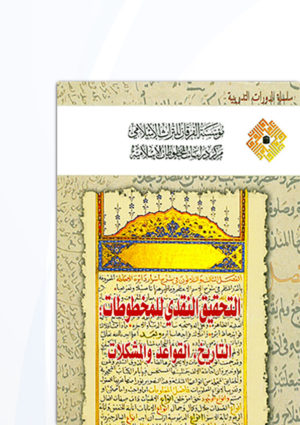Pursuant to the clauses of the Memorandum for Understanding and Co-operation between Al-Furqan Islamic Heritage Foundation and Al-Az’har, and particularly those dealing with the organisation of conferences, seminars, workshops, training courses, lectures and any other work related to manuscripts and the objectives of Islamic law (maqasid), an introductory course on editing manuscripts was organised by Al-Furqan Foundation in collaboration with the Centre for Editing Texts (Markaz Tahqiq al-Nusus) at Al-Az’har, under the title “Methods and Rules of Critical Edition- Introductory Course on Editing Manuscripts”.
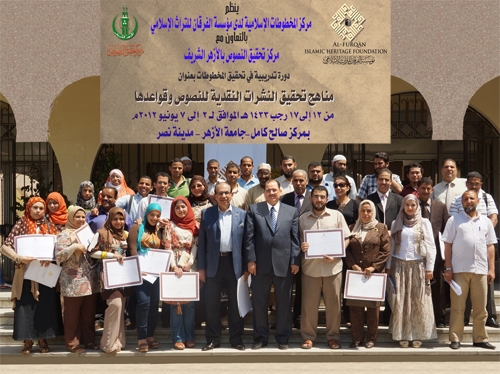
The course took place at Salih Kamil Centre at Al-Az’har University in Cairo and lasted a whole week, from 2nd to 7th June 2012, with participants coming from a highly qualified and experienced scientific elite (holding postgraduate diplomas and doctorates) from different university disciplines and cultural institutions from Egypt, Saudi Arabia, Morocco, Nigeria and Indonesia.
The number of participants reached 42, with a number of eminent professors in all disciplines in the sciences of manuscripts teaching there, including Professor Hassan al-Shafe’i, Professor Hussain Nassar, Professor Ayman Fouad Sayyid, Professor Abdul-Hameed Madkour, Professor Mohamed Galal Abdel-Wahab, and others.
The opening ceremony of the course took place at Salih Kamil hall, on 12th June 2012, where Dr. Ayman Fouad Sayyid, director of the Centre for Editing Texts at Al-Az'har held his opening speech, in which, he welcomed the collaboration with Al-Furqan Islamic Heritage Foundation in organising the course, whilst praising the cultural work conducted by the Foundation in the field of manuscripts, as well as its track record in surveying, cataloguing and preserving manuscripts, referring also to those programs, projects and scientific conferences which are worthy of attention and gratitude.
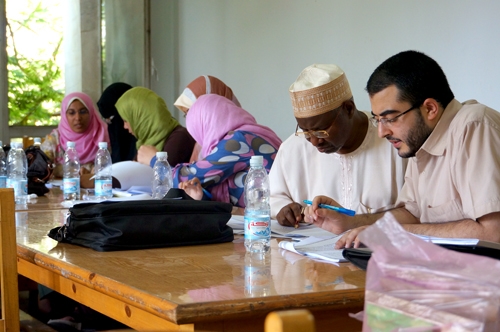
Mr. Mohamed Drioueche, the head of the Projects & Publications Department at Al-Furqan, spoke on behalf of the Foundation and welcomed the participants and their tutors, also paying a tribute to the Grand Imam/Sheikh of Al-Az'har, Dr. Ahmed al-Tayeb, and to Dr. Ayman Fouad Sayyid, director of the Centre for Editing Texts. Mr. Drioueche explained to the attendees the clear concept followed by the Foundation in order to achieve its objectives and particularly those related to the preservation of Islamic heritage, by facilitating the found knowledge to the future generations and publishing it with the usage of scientific methods. In addition, he explained the Foundation's plans since its establishment and the way followed towards the achievement of these goals, without deviating or reversing from its purpose. The achievement of these objectives has been fulfilled through the preparation of an ambitious and comprehensive research project that deals with cataloguing the Islamic manuscripts all over the world and selecting those of scientific significance in order to be edited and published, whereas parallel to these tasks, a large number of lectures, conferences, seminars and courses in cataloguing manuscripts are organised, with 11 courses completed so far.
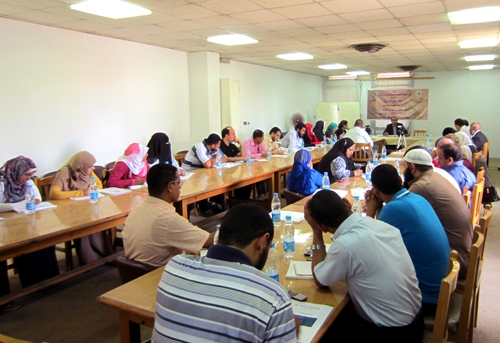
The Foundation realised that the heritage field is in urgent need of young editors and with the fear of the extinction of manuscripts, due to their decreased number, it set up training courses in editing manuscripts; it organised two courses in the Faculty of Dar al-Uloom in Cairo, while this course is regarded as being the third one on editing manuscripts and more precisely, it is considered to be an introductory course for the annual courses, which would be more specialised, intensive and deeper, so that each discipline can be addressed separately.
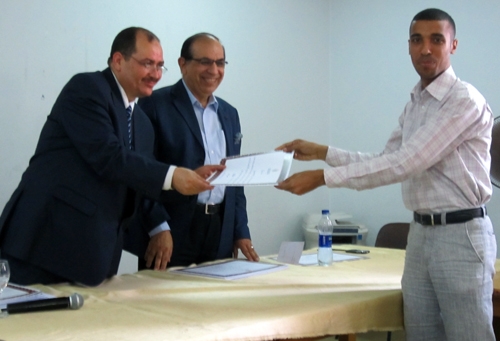
During the closing ceremony, certificates were distributed to the successful participants, while the attendees praised His Excellency Sheikh Ahmed Zaki Yamani, the chairman of Al-Furqan Islamic Heritage Foundation, for his financial and moral support of this course, as well as the Board of Experts, and the organising committee.
Dr. Abu Tareq Abu al-Wafa Mohammad talked about the impressions of those who attended the course and their benefits from it, praising also the role that Al-Furqan has played in preserving the treasures of manuscripts and rare books, and making them available to researchers, by publishing them, and providing them with skills and knowledge. Furthermore, he referred to the course program, characterised by pairing theory and practice, the good selection of lecturers and trainers, as well as to the great impact of the course in raising awareness on manuscripts; which was the most important achievement of the course. In addition, he paid tribute to its organisational aspect provided by the Foundation.
The same impression was confirmed by the professors who lectured in this course, who also praised the Foundation in terms of planning, selecting the topics and developing a program, taking into account the scientific aspect and the good selection of trainers and participants.


